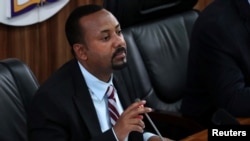Ethiopian Prime Minister Abiy Ahmed says his country remains united after a week of violent clashes left at least 67 people dead and several religious sites destroyed.
Now, he is trying to restore calm.
In a statement issued Saturday, Abiy said he was deeply saddened by the spate of attacks.
“This is a test that shows if Ethiopians don’t work together in collaboration and in unison, that it could turn our road to be a difficult and a scary one,” he wrote in Amharic.
The clashes began Wednesday, when a prominent activist from the Oromo ethnic group, Jawar Mohammed, publicly accused government security forces of plotting an attack against him, a claim denied by local police.
A chaotic wave of violence ensued. Protestors, some from rival groups, took to the streets. Arsonists set buildings ablaze. Security forces descended and struggled to restore calm.
Sixty-two protesters and five police officers were killed, Reuters reported.
Most were stoned to death, with many of the fatalities occurring in the city of Adama and the surrounding Oromia region.
‘Looking for shelter’
Ethiopia is home to a diverse set of ethnicities and religious groups, and some of last week’s violence appears to be based on ethnicity and religion.
“Houses of worship were burnt down. Businesses and residential homes have been destroyed. Displaced people are looking for shelter in different places,” Abiy wrote. “Deeds that are horrific to hear, let alone to see, have been committed against our citizens.”
In an interview with VOA, Jawar said he and other leaders have called for calm.
“Almost all the opposition leaders, elders, clergymen and myself appealed for people to remain calm, to return home, to open roads and be patient,” he said. “So people quickly responded by disbanding protesters, removing roadblocks and returning to their homes, to their normal lives. So, normal business activity has resumed.”
Jawar added that he believes people came from outside the region to cause mischief and attack protesters.
“They are saying strangers from out of town descended on towns engaged in violence and attacks, and also hooligans in inner cities have been involved. It is yet to be cleared what happened,” he said.
In his statement, Abiy said he saw evidence the country can be united, even in the aftermath of such a violent week. He rejected division based on religion or ethnicity, underscoring the country’s capacity for unity.
“Even though we are saddened by this heartbreaking situation, we were able to see that Ethiopians are still great, observant and reasonable people,” he wrote.
“We have Muslims who protect churches from burning down and Christians who stand on guard to prevent Mosques from burning down. We have Ethiopian citizens who pay a price to protect someone who is outside of their ethnic group,” Abiy said.
But several ethnic groups continue to vie for recognition as independent, autonomous regions within the country. Other groups seek statehood altogether separate from Ethiopia, an ongoing concern for the government less than a year before voters head to the polls for the country’s national election, in May.










